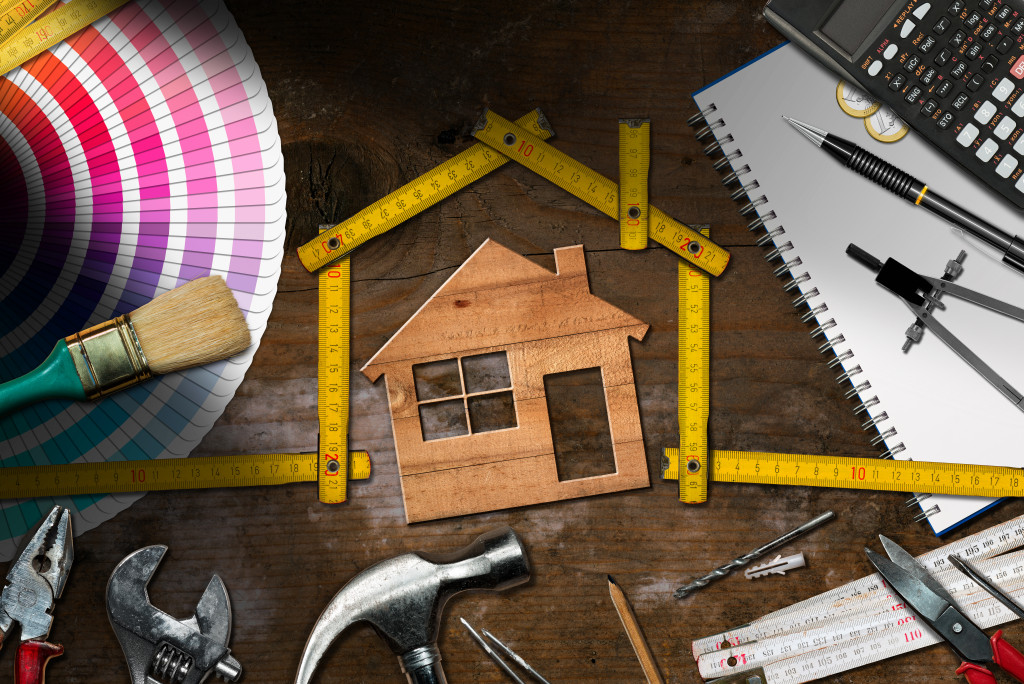- Research the cost of materials, labor, and other expenses like tools and equipment rentals before starting.
- Make sure to hire reliable contractors with the required licenses, certifications, and insurance coverage.
- Obtain necessary building permits and comply with local regulations.
- Select high-quality materials for desired outcomes and to ensure durability.
- Explore financing options such as mortgage refinancing to access additional funds.
Home improvement projects can transform your living space, increase its value, and enhance your overall quality of life. Whether you’re considering minor updates or major renovations, it’s important to understand the essentials before diving into any home improvement project. This guide will explore five essential factors you must know about to ensure a successful home improvement journey.
1. Planning and Budgeting
Before starting any home improvement project, planning and establishing a realistic budget is crucial. Proper planning and budgeting will help you stay organized and prevent unexpected expenses or delays.
Here are tips for planning and budgeting for home improvements:
Set a Realistic Budget
As with any project, having a budget and staying within it is important. Estimate the cost of materials, labor, permits or licenses, and other expenses such as tools and equipment rentals. Factor in 10-20% of your budget to cover unexpected costs. Also, consider that some projects may take longer than expected, so make sure you allocate enough funds for the entire project duration.
Research Project Costs

Before starting the project, research associated costs for materials, labor and other related expenses like tool rentals or permit/license fees. Try to compare prices from different vendors or contractors before committing to a purchase or service provider. This will help you determine the best value for your money.
Make a List of Necessary Supplies
Once you know the costs associated with the project, list all necessary supplies and equipment needed to complete the job. This will help keep you organized and prevent any unnecessary purchases.
Get Quotes from Contractors
If you plan to hire contractors or specialists for your home improvement project, it is important to get quotes from several providers before deciding. Compare prices, services offered, as well as warranties and other details to ensure you are getting the most bang for your buck. Additionally, ask for recommendations or read reviews online, if available, to determine the quality of service each contractor provides. Taking the time to research and compare prices will help make sure you get the best value for your money.
2. Hiring Reliable Contractors
For complex or specialized home improvement projects, hiring reliable contractors is essential. Do thorough research, ask for recommendations, and interview multiple contractors to ensure you find the right fit for your project. Check their licenses, certifications, and insurance coverage to ensure they are qualified and reputable. Ask for references and examples of their previous work to gauge their expertise and quality of craftsmanship. Clear communication and a detailed contract are crucial for a successful working relationship with your contractor.
3. Building Permits and Regulations
Depending on the scope of your home improvement project, you may need to obtain building permits and comply with local regulations. Research the specific requirements for your area and ensure you obtain the necessary permits before starting any construction work. Failing to comply with regulations can result in fines or the need to undo completed work. Consulting with a professional or contacting your local building department can help clarify the permitting process and ensure your project complies with the law.
4. Material Selection and Quality

Choosing the right materials for your home improvement project is essential for achieving the desired outcome and ensuring durability. Research different materials, and consider their aesthetic appeal, functionality, and maintenance requirements. Look for high-quality materials that offer good value for your investment. Consider factors such as energy efficiency, sustainability, and longevity. Investing in quality materials can save you money in the long run by reducing the need for frequent repairs or replacements.
5. Financing Options and Mortgage Refinancing
Home improvement projects can be costly, but there are various financing options available to help you fund your renovations. One popular option is mortgage refinancing, which allows you to leverage the equity in your home to obtain a new mortgage with better terms. By refinancing, you may be able to secure a lower interest rate, extend the repayment period, or access additional funds for your home improvement projects. Consulting with a reliable mortgage lender can help you understand the options and determine if refinancing suits your needs. A mortgage lender can also estimate the total refinancing costs, including closing costs and other expenses.
In Summary
Understanding home improvement essentials is crucial for a successful and satisfying renovation experience. Proper planning, budgeting, and hiring reliable contractors are key to ensuring your projects are completed to your satisfaction. Complying with building permits and regulations, selecting high-quality materials, and exploring financing options like mortgage refinancing can further enhance your home improvement journey. With these essentials in mind, you’ll be well-prepared to embark on your home improvement projects and create a living space that meets your needs and reflects your personal style.

